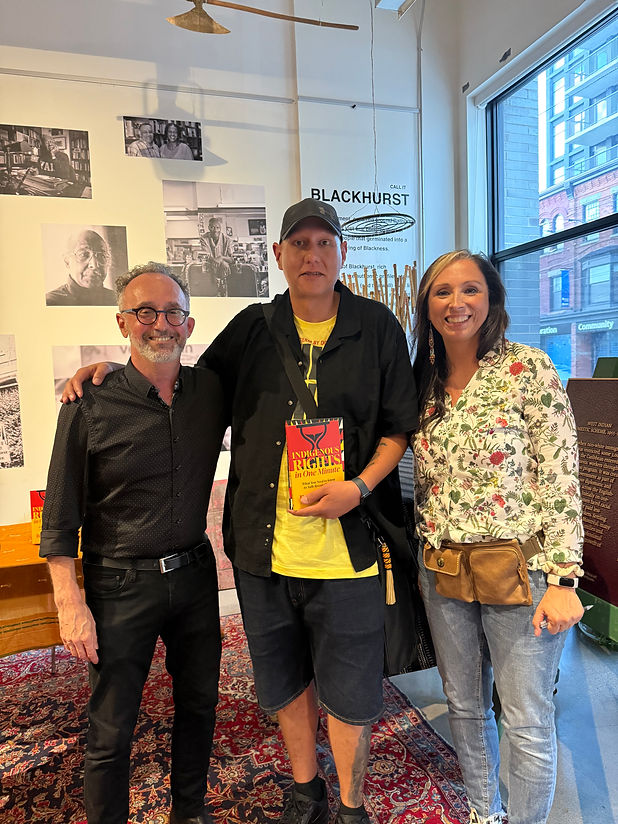
Indigenous Consultation & Decolonial Strategy
The One Dish Project provides Indigenous-led consultation rooted in governance, lived experience, and land-based responsibility. Our approach is guided by wampum-based methodology and designed to support meaningful, long-term change.
We work with schools, boards, unions, municipalities, and community organizations that are ready to move beyond surface-level efforts. This is not about optics. It is about building accountable systems that reflect Indigenous knowledge, law, and responsibility.
Rates and Availability
All consultation and workshop rates are determined based on scope, duration, and organizational structure.
We prioritize community-led and land-based work.
To inquire about rates, availability, or to request a proposal, please contact us directly.
Important Notice
The One Dish Project operates independently and is guided by Indigenous law, not colonial institutional standards. We reserve the right to decline consultation requests that are performative, extractive, or not aligned with the values of accountability, responsibility, and community-led change.
Workshops and services are not intended for settler-facing public relations or token inclusion. This is not cultural entertainment. This is governance-based work.
Engagement must begin with clarity and respect. If your organization is not prepared to take meaningful action or centre Indigenous direction, this may not be the right fit.
Services Offered
We offer Indigenous-led consultation, education support, and program development rooted in governance, community responsibility, and lived experience. All services are aligned with current qualifications in K–12 Kanyen’kéha and First Nations, Métis, and Inuit Studies, and with on-the-ground work in land-based education and Indigenous law.
Available Services
-
Curriculum and policy review
FNMI and Indigenous language program alignment for schools, boards, and agencies.
-
Land-based program development
Design and implementation of projects grounded in local knowledge, seasonal cycles, and cultural practice.
-
Indigenous language support
Strategic planning and resource design based on language education experience in Kanyen’kéha.
-
Cultural safety and anti-oppression training
Indigenous-led sessions focused on responsibility, not performance.
-
Governance and treaty education
Delivery rooted in Haudenosaunee law, Two Row Wampum, and lived Nation-to-Nation frameworks.
-
Decolonial audits
Education, agency, or community-level assessments of systemic practices, language, and structure.
-
Public speaking and facilitation
Keynotes, panels, and group sessions on Indigenous education, law, governance, and land-based learning.
Workshops
Workshops are available as part of ongoing consultation or by request. All sessions are grounded in lived experience, Indigenous governance, and classroom-based application. These are not pre-packaged presentations. Each one is tailored to your context and delivered with clarity and purpose.
Current Available Workshops
-
Indigenous Governance and Treaty Responsibility
Explores the foundations of Indigenous governance systems, including Haudenosaunee structure, Two Row Wampum, and treaty relationships. Emphasizes law over metaphor and positions governance as active, ongoing, and community-held. Suitable for leadership teams, educators, or agencies working in Indigenous territories.
-
Decolonizing the Classroom
Practical strategies for shifting away from colonial teaching models in K–12 settings. Covers grading, assessment, land-based learning, language inclusion, and the replacement of settler narratives with Indigenous truths. Ideal for teachers and administrators in need of structural change, not just content add-ons.
-
Land-Based Learning and Community Engagement
Introduces ways to build land-based education grounded in local knowledge, seasonal cycles, and Indigenous law. Focuses on program planning, relationship-building, and the difference between land on a lesson plan and land as the lesson plan. Designed for educators, coordinators, or organizations ready to work on the ground.
-
Cultural Safety and Anti-Oppression (Indigenous-Led)
A grounded and direct session on settler colonialism, institutional power, and Indigenous realities in education and workplace systems. Rejects checklist approaches. Centres lived truth, community trauma, and Indigenous agency. Must be booked with clear intent and preparation.

About the Consultant
Sha’tekayèn:ton Andrew Brant
Dip. Kanyen’kéha | B.Ed. | OCT
Sha’tekayèn:ton Brant is Kanyen'kehá:ka from Tyendinaga Mohawk Territory. He is a certified Mohawk Language and Indigenous Studies teacher, permanently employed by the Mohawks of the Bay of Quinte. He holds a Bachelor of Education from Queen’s University through the Indigenous Teacher Education Program and a Diploma in Kanyen’kéha from Trent University.
He is the founder of the One Dish Project, a grassroots initiative focused on food sovereignty, land-based education, and governance rooted in Indigenous law. The project is fully sustained through Two Row Coffee and Tea Company, a business he owns and operates without colonial funding or outside investors.
Sha’tekayèn:ton provides Indigenous-led consultation to schools, boards, agencies, unions, and community organizations. His services include curriculum development, land-based program design, policy review, cultural safety training, and systems realignment based on Indigenous governance. This is not symbolic inclusion. It is structural transformation.
He also hosts The Hidden Coffee House Podcast, which speaks directly to land, law, language, and the systems built on ongoing colonialism. The podcast is used by educators, organizers, and community members seeking clarity and direction.
In addition to this work, Sha’tekayèn:ton conducts spiritual investigation through a Kanyen’kehá:ka lens. This includes site-based work involving ancestral presence, silenced histories, and cultural restoration. It is not paranormal entertainment. It is reclamation.
Every part of this work is interconnected. It is grounded in responsibility, not approval. Sha’tekayèn:ton does not offer reconciliation. He offers truth. He offers governance.


Get in Touch
To for any inquiries or to book a workshop or speaking event, please contact onedishproject@gmail.com